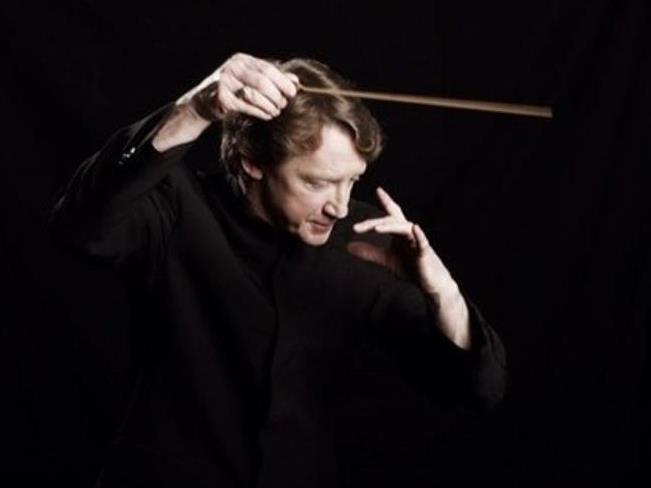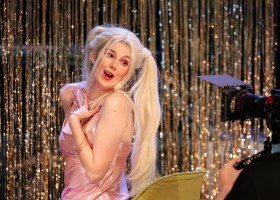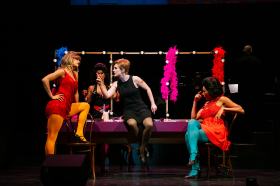Douglas Boyd, conductor for Beethoven Festival presented by the Melbourne Symphony Orchestra.
Hamer Hall was full for this final concert in the Beethoven Festival presented by the Melbourne Symphony Orchestra that featured over four concerts the five piano concertos performed by Paul Lewis under guest conductor Douglas Boyd. The three works performed on this occasion were Haydn’s Symphony No 104 ‘London’, Alban Berg’s Piano Sonata, Op 1 orchestrated by Chinese-Australian composer Julian Yu and Beethoven’s popular Piano Concert No 5 ‘Emperor’.
A piece written in the Festival’s printed program states that the modern piano is an “evolution” from the original as used by Beethoven. Perhaps so, but not one instrument in the modern orchestra has remained unchanged since Beethoven’s time. To restore the original shaping (Gestalt) of Haydn and Beethoven is difficult, since modern violins with their steel strings sound too prominent and can lack subtlety and appropriate colour. Moreover, revisions to woodwinds have led to problematic issues of ensemble balance and voicing of chords. But the crucial difference is the piano. The sound of the Steinway and Son’s Hamburg D, though it is a supremely fine instrument, is vastly different from that of the original Walter & Sons instrument Beethoven played. I’m not suggesting Beethoven would not have been delighted had he known the modern piano, but I wager he would have written different music for it.
The London Symphony is one of Haydn’s grander and most ebullient. From its opening in unison octaves, a motive from the key centre to the fifth and back to the tonic, we could hear a strong connection to Haydn’s student, Beethoven. The ensemble dived headlong into the ebullient Allegro with enthusiasm. The Andante delighted for its Classical delicacy and refinement though seeking in vain for the innocence and simplicity with the instruments it was played on, particularly in regard to Haydn’s delightful cadential elaborations; woodwind tuning was also a problem. The rustic, dance-like Menuetto (Allegro) – Trio felt hefty. The Finale (Allegro spiritoso) resumed the generous enthusiasm of the opening.
The item sourced from the Second Viennese School on this occasion was an orchestral arrangement undertaken as a well-meaning student exercise by Julian Yu (1980; revised 1992) of Alban Berg’s Piano Sonata, Op 1. I expect that Berg, a careful and fastidiously precise composer, would have never wanted nor agreed to such alterations to his score. Though a major undertaking by Yu, nothing was much added by this extensive arrangement; the work instead appeared to be sapped of its agility, fragility, succinctness and elegance. If only Berg’s Three Pieces for orchestra, Op 6 or Webern’s Passacaglia, Op 1 had been programmed instead, that may have yielded a highlight of the festival.
From as early as 1796, Beethoven began to have trouble with his hearing. He kept this a secret until confiding to his friend Wegeler in Bonn in 1801. From the description of his symptoms, modern otologists have suggested that his deafness was caused by otosclerosis of the ‘mixed’ type causing the degeneration of the auditory nerve; at the time a progressive and incurable condition but today a condition which can be repaired through surgical procedure. Added to the composer’s already perceived lack of good manners and unimpressive social standing, his condition rendered him even more of a social outcast. Beethoven wrote his final piano concerto more than a decade after his hearing difficulties commenced. The work approaches the outside limits of the instrument he knew, and although Lewis’s performance was excellent it could hardly find this sense of radical urgency and extremity on a modern instrument. The expansive opening Allegro interleaved with its delicate cross-rhythm sections was flawlessly performed. The silken Adagio un poco mosso was heartfelt, mesmerizingly still and never cloying. The Rondo (Allegro) delighted for its exuberance and joie de vivre, bringing this challenging Beethoven Festival to its conclusion with a standing ovation for the soloist.
Rating: 3 ½ stars out of 5
Melbourne Symphony Orchestra
Douglas Boyd, conductor
Paul Lewis, piano
Hamer Hall Melbourne Arts Centre
17 September 2016






